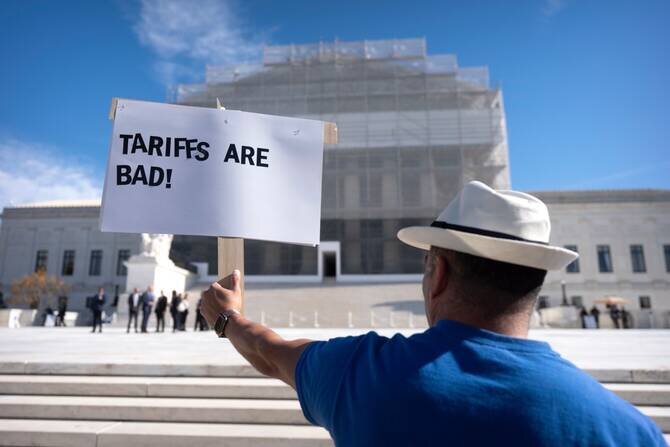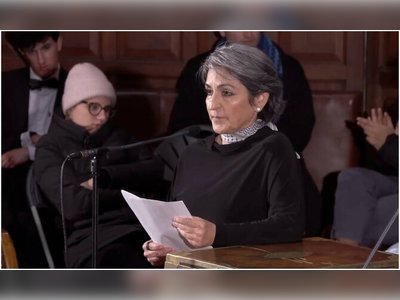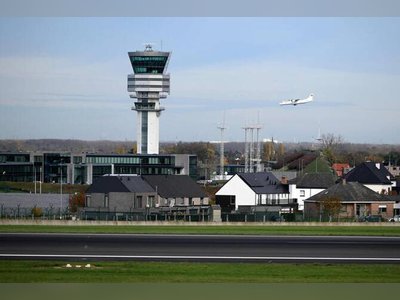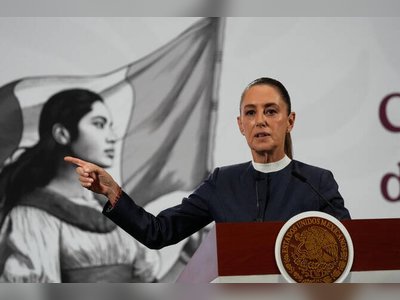
US Supreme Court Questions Legality of Trump's Global Tariffs
Justices raise doubts over President Donald Trump's sweeping tariffs in a case with implications for the global economy.
The US Supreme Court justices expressed skepticism on Wednesday regarding the legal basis for President Donald Trump's broad tariffs, highlighting a significant test of his executive powers.
The case, which has far-reaching implications for the global economy, pits Trump's administration against businesses and states challenging the tariffs as an overreach of presidential authority.
During a hearing that lasted more than 2 hours and 30 minutes, conservative and liberal justices alike interrogated US Solicitor General D.
John Sauer, representing the administration.
The debate centered on whether a 1977 law intended for national emergencies granted Trump the power to impose tariffs without congressional approval.
Justice Amy Coney Barrett questioned Sauer about the historical use of the International Emergency Economic Powers Act (IEEPA) in relation to regulating importation and imposing tariffs.
Chief Justice John Roberts suggested that the court might apply its "major questions" doctrine, which demands clear Congressional authorization for executive actions with significant economic impacts.
This doctrine has previously been invoked by the Court to limit key policies of Trump's predecessor, Joe Biden.
Roberts highlighted the considerable authority vested in Congress regarding taxation and tariffs.
The Supreme Court traditionally takes months to issue decisions after hearing arguments; however, the administration urged a swift ruling in this case.
US Treasury Secretary Scott Bessent expressed optimism about the court's stance on the tariffs, stating that alternative legal measures would be pursued if necessary to maintain them.
Trump has leveraged IEEPA to impose tariffs as a means of negotiating trade agreements and punishing countries through economic leverage.
The tariffs under scrutiny were imposed in response to trade deficits and the ongoing global trade war.
Critics argue that these measures risk retaliatory actions from trading partners, increasing economic uncertainty.
The Supreme Court's consideration of this case underscores the tensions between executive and legislative powers, particularly concerning foreign policy and economic governance.
Justice Brett Kavanaugh provided historical context by referencing President Richard Nixon's imposition of a worldwide tariff in the 1970s under IEEPA's predecessor statute.
This discussion suggests potential divisions within the court regarding the scope of presidential authority.
Chief Justice Roberts emphasized the executive's role in foreign affairs, acknowledging that tariffs can provide leverage in trade negotiations.
However, concerns about the Constitution's separation of powers were raised by questions from conservative Justice Neil Gorsuch, who pondered why Congress might abdicate its responsibilities over regulating foreign commerce to the President.
The case is expected to have significant repercussions for US trade policies and the balance of power between the executive and legislative branches.
The case, which has far-reaching implications for the global economy, pits Trump's administration against businesses and states challenging the tariffs as an overreach of presidential authority.
During a hearing that lasted more than 2 hours and 30 minutes, conservative and liberal justices alike interrogated US Solicitor General D.
John Sauer, representing the administration.
The debate centered on whether a 1977 law intended for national emergencies granted Trump the power to impose tariffs without congressional approval.
Justice Amy Coney Barrett questioned Sauer about the historical use of the International Emergency Economic Powers Act (IEEPA) in relation to regulating importation and imposing tariffs.
Chief Justice John Roberts suggested that the court might apply its "major questions" doctrine, which demands clear Congressional authorization for executive actions with significant economic impacts.
This doctrine has previously been invoked by the Court to limit key policies of Trump's predecessor, Joe Biden.
Roberts highlighted the considerable authority vested in Congress regarding taxation and tariffs.
The Supreme Court traditionally takes months to issue decisions after hearing arguments; however, the administration urged a swift ruling in this case.
US Treasury Secretary Scott Bessent expressed optimism about the court's stance on the tariffs, stating that alternative legal measures would be pursued if necessary to maintain them.
Trump has leveraged IEEPA to impose tariffs as a means of negotiating trade agreements and punishing countries through economic leverage.
The tariffs under scrutiny were imposed in response to trade deficits and the ongoing global trade war.
Critics argue that these measures risk retaliatory actions from trading partners, increasing economic uncertainty.
The Supreme Court's consideration of this case underscores the tensions between executive and legislative powers, particularly concerning foreign policy and economic governance.
Justice Brett Kavanaugh provided historical context by referencing President Richard Nixon's imposition of a worldwide tariff in the 1970s under IEEPA's predecessor statute.
This discussion suggests potential divisions within the court regarding the scope of presidential authority.
Chief Justice Roberts emphasized the executive's role in foreign affairs, acknowledging that tariffs can provide leverage in trade negotiations.
However, concerns about the Constitution's separation of powers were raised by questions from conservative Justice Neil Gorsuch, who pondered why Congress might abdicate its responsibilities over regulating foreign commerce to the President.
The case is expected to have significant repercussions for US trade policies and the balance of power between the executive and legislative branches.










